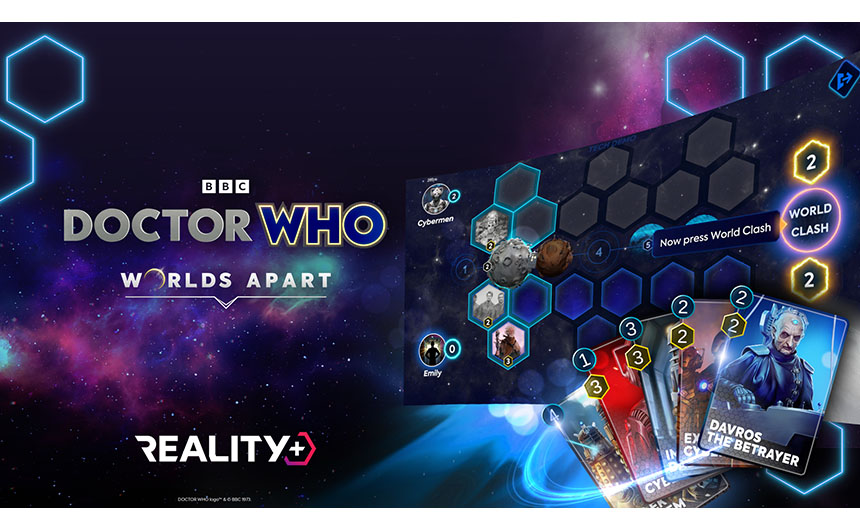Reality+ co-founder Tony Pearce walks through everything you need to know about Web3, plus data and insights from live projects with some of the world’s leading IP owners.
Web3 represents a paradigm shift in how content is created, shared, and consumed on the internet. For entertainment, sports and lifestyle brands, it offers an unprecedented opportunity to enhance customer interactions, redefine product promotion, and bolster reputation.
But it’s essential to undertake some due diligence on the technology and best practice before embarking on your Web3 journey. Get things right, and the potential rewards for your brand and its fans are tremendously exciting.
In this article, Reality+ co-founder Tony Pearce walks through everything you need to know about Web3, plus data and insights from live projects with some of the world’s leading IP owners.
Understanding Web3: Web3 isn’t just the next phase of the internet or a buzzword that will disappear in 12 months time; it’s a revolution in user engagement and content delivery. It represents a decentralised and more democratic internet, based around peer-to-peer models that thrive on user contribution, which helps to keep power away from the kind of content and network gatekeepers we see in the ‘traditional’ internet. This shift allows for a richer, more tailored content. For brands, this translates to experiences that resonate deeply with individual consumers.
Rooted in the Blockchain: Web3 is intrinsically tied to blockchain technology, enabling brands to leverage crypto-wallets for content purchases, ticket sales or even unique merchandise. In addition, blockchain can ensure the authenticity and limited availability of digital collectables, leading to new revenue streams. A great example of this can be found in the BBC Studios’ Doctor Who: Worlds Apart, which combines global fandom, games and digital collectibles, into a pick-up-and-play, fast paced digital trading card experience driven by Web3. To date over 1.5 million NFT-based digital cards have been created, with 40% of players trading with each other on the Doctor Who: Worlds Apart marketplace.

Personalised Content Delivery: With Web3, brands can leverage AI and advanced algorithms to curate content specifically suited to an individual’s preferences. Instead of blanket promotions, films, music, games, sports and other entertainment media can be presented to users based on their past behaviour, social interactions and even mood. Iconic fashion brand Paul Frank will be doing just that in 2024, Reality+ will be taking its famous Julius the Monkey character to the metaverse. The Web3 element will give customers an NFT ‘digital twin’ of physical t-shirts they buy, which they can then also wear in a game or metaverse. One to keep an eye on.
Enhanced Interactivity: Web3 facilitates two-way models. Entertainment brands can create interactive platforms where fans can participate in content creation, offer feedback in real-time, and become a part of a collaborative entertainment process. ITV Studios did just that this year with Thunderbirds: International Rescue Club, a next-generation version of the Thunderbirds franchise that is both immersive and interactive.
Owners of Thunderbirds International Rescue Club NFTs were granted access to their own unique 3D avatar for use in The Sandbox Metaverse, alongside unique competitions, giveaways, free drops, and official merchandise, plus 15 quests and mini games leveraging the benefits of Web3. There was also a charity element that enabled community members to collectively make decisions on ‘Rescue Club’ donations. The resulting engagement was eye-opening, with 550,000 quests completed, and each fan spending an average 29 minute session play time, compared to the average for the entire Sandbox.
 Leveraging Augmented Reality (AR) and Virtual Reality (VR) in the Metaverse: Web3’s semantic capabilities combined with AR and VR offer entertainment brands a chance to create immersive experiences in the Metaverse. Imagine attending a virtual concert of your favourite band or walking through a film set, all from the comfort of your home. Reality+ is working with BBC Studios, another UK broadcaster launching into The Sandbox metaverse later this year, when fans will be able to interact with immersive content from their favourite IPs, including Top Gear and Doctor Who, and enjoy a BBC events space.
Leveraging Augmented Reality (AR) and Virtual Reality (VR) in the Metaverse: Web3’s semantic capabilities combined with AR and VR offer entertainment brands a chance to create immersive experiences in the Metaverse. Imagine attending a virtual concert of your favourite band or walking through a film set, all from the comfort of your home. Reality+ is working with BBC Studios, another UK broadcaster launching into The Sandbox metaverse later this year, when fans will be able to interact with immersive content from their favourite IPs, including Top Gear and Doctor Who, and enjoy a BBC events space.
Part virtual real estate, part amusement park, The Sandbox fully embraces the idea of the metaverse as a continuous shared digital space, in which players and brands can build, own, and monetise their experiences on blockchain. In fact, ITV Studios and BBC Studios are not alone, joining over 400 other entertainment brands who have entered The Sandbox to date, including Warner Music Group, Ubisoft, Gucci Vault, The Walking Dead and Adidas.
Reputation Management through Decentralisation: Web3’s emphasis on decentralisation gives users more control over their data. Entertainment brands can leverage this by creating transparent systems where users willingly share data in exchange for personalised experiences, enhancing trust and loyalty.
Real-time Data Analysis: Immediate feedback through Web3 platforms allows brands to gauge audience reactions to new releases or promotional strategies, adjusting in real-time for maximum impact. This was leveraged by FIFA this summer as part of the Women’s World Cup, which was accompanied by landmark Web3 game Own The Zone that used real-time sports data to allow players to predict the action as the games are happening. Correct predictions rewarded players with unique FIFA Women’s World Cup themed digital collectable NFTs.
To summarise, Web3 provides an avenue for brands to connect deeply with fans, offer tailored content, and create multi-dimensional experiences. As the boundaries between reality and the digital realm blur, entertainment entities that can weave their narratives into this Web3 tapestry will undoubtedly lead the future.
It’s not just about being present in this new space; it’s about resonating in it.
Of course, while Web3 offers vast potential, entertainment brands must also be aware of associated challenges. Ensuring user privacy, managing the vast amounts of data, and continuously updating to the latest digital trends are paramount, which means choosing the right partners for your Web3 journey is critical.

































